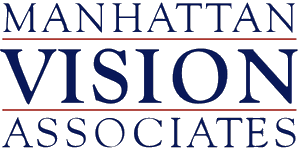
Why Health Professionals Refer Patients To Us For Customized Contact Lens Fittings
Manhattan Vision Associates is a contact lens practice that continues to develop great relationships with other practitioners around the New York City area. We work with corneal specialists and other physicians to offer a continuum of care for their patients with corneal irregularities by providing advanced custom contact lens fittings, even for the most hard-to-fit patients.
Our training and expertise in the area of scleral and other custom-fit contact lenses is the primary reason that other healthcare professionals refer to our practice.
We’re Here For Your Patients
The health care professionals you choose to refer your patients to matters.
You want your patients to visit a practice where they’re offered world-class eye care, professionalism and empathy. That’s why we do the utmost to ensure a quality experience for all of the patients you refer.
We know that patients want to be heard. We set aside time to discuss and evaluate their needs.
Your patients deserve safe and effective treatment, which is why the treatment we provide is evidence-based and utilizes the most advanced technology — all with utmost professionalism and care.
List of Common Corneal Conditions
We evaluate, diagnose and recommend treatment for all types of corneal conditions, including:
- Keratoconus/Keratoglobus
- Post LASIK/RK/PRK Ectasia
- Post PK/INTACS/DMEK/DALK/DSAEK, etc.
- Post Corneal Cross Linking
- Corneal Dystrophies, such as Fuchs’ and Map-dot-fingertip corneal dystrophy
- Severe Ocular Surface Disease (OSD)
- Aniridia, ICE Syndromes and Trauma
- Corneal Scarring

Why Scleral Contact Lenses?
The many benefits of scleral lenses render them a popular and satisfying choice for patients with corneal irregularities who desire clear and comfortable vision.
Custom-designed scleral lenses help patients with a range of corneal conditions achieve dramatic improvements in visual acuity and comfort. The lenses’ oxygen-permeable and fluid-filled chamber protects the eye while providing the moisture and oxygen it needs to stay healthy. This makes scleral lenses the best choice for promoting corneal healing.
Case Studies
Here are a few examples showing the typical patient presentations and the successful outcomes.
*These patient testimonials are meant to reflect actual testimonials of patients but not necessarily our patients.
Post Corneal Graft
Patients with keratoconus or corneal transplants can see clearly by wearing scleral contact lenses; they are the safest and best way to correct vision for irregular astigmatism. Following a corneal transplant, the cornea should not come in contact with a contact lens. This makes scleral lenses the optimal solution, as they vault over the cornea without touching it directly.
John came to our practice seeking a solution for his keratoconus, which affected both of his eyes. He had recently undergone a corneal transplant and had a corneal graft for his keratoconus.
In order to improve John’s visual acuity, we did the following:
We took a topography reading of 11,000 points on each cornea and then designed the lens to individually match all 11,000 points of the patient’s corneas. Because he had a corneal transplant, it was crucial that the lens not touch any part of the graft to ensure maximum comfort.
OCT images were used to measure the clearance in microns, between the back surface of the scleral lens and the front surface of the cornea. This maintains a healthy graft while wearing the contact lenses.
As a result, John was able to achieve 20/25 vision in both eyes. He now has clear, comfortable vision all day and is very pleased with his scleral lenses.
Post LASIK Complications
While LASIK surgery has a high success rate, some patients come out of the surgery with imperfect vision.
Debbi’s primary concern was the reduced visual acuity following refractive laser surgery.
Unfortunately, her post-LASIK resulted in sub-optimal vision. Her LASIK surgeon recommended an enhancement procedure to improve her vision, which led her to undergo subsequent LASIK surgeries. Unfortunately, these attempts left her with extremely poor vision in each eye, and Debbi was desperate to find a solution to her vision problems.
Debbi arrived at our practice after hearing that we specialize in helping people achieve clear vision following poor LASIK results. A comprehensive eye exam found that Debbi’s eyes had a very high prescription and irregular astigmatism following her surgery.
Her best option was to wear scleral lenses as they would correct her astigmatism and farsightedness and were perfectly safe for her corneas, which after multiple surgeries, were scarred.
Since getting fitted for her custom-designed scleral lenses, Debbi is thrilled with how sharp and comfortable her vision has become.
Post-Radial Keratotomy Surgery Complications
Many patients underwent radial keratotomy (RK) surgery to correct myopia and astigmatism during the early days of refractive surgery. Such patients sometimes experienced some refractive error in the form of nearsightedness, farsightedness, or irregular astigmatism. Those with irregular astigmatism experience blurred, distorted vision that cannot be corrected with glasses. These are among the more serious and frequently occurring complications following corneal refractive surgery.
Matthew, a 52-year-old teacher, underwent bilateral RK surgery in 1995. Though the initial results were positive, within two years his vision deteriorated. He developed corneal ectasia, and complained of blurred vision, discomfort and red eyes when wearing contact lenses.
The slit-lamp examination revealed damaged corneas that had severe staining along the incision lines and around the cornea at the limbus. This was a result of the fit of the GP lenses he was wearing at the time. These lenses were touching the anterior elevations of the cornea and did not allow for enough tear exchange.
Fitting a scleral lens was the best option to treat Matthew’s damaged corneas, alleviate discomfort and improve his vision.
At the one-year visit the patient had improved visual acuity and quality. The fitting of a well-designed semi-scleral GP contact lens filled with a saline solution created a healthy environment behind the lens, which in turn allowed the cornea and limbus to heal. The scleral lenses also helped protect the RK incisions from further abrasions caused by blinking.
As this case demonstrates, patients who developed irregular corneal surfaces following refractive surgery can benefit from a customized scleral contact lens designed to improve their wearing comfort and vision.
Who We Work With
We work with many practitioners including:
- Family doctors
- Local hospitals
- Optometrists
- Ophthalmologists
- Corneal specialists
Feel free to contact us for more information or with any inquiries. We look forward to providing your referred patients with world-class eye care.
Our practice serves patients from Manhattan, Queens, Brooklyn, and the Bronx, New York and surrounding communities.